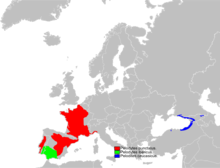Pelodytidae
| Parsley frog Temporal range: 47–0 Ma Mid Eocene – Recent |
|
|---|---|
 |
|
| Common parsley frog | |
| Scientific classification | |
| Kingdom: | Animalia |
| Phylum: | Chordata |
| Class: | Amphibia |
| Order: | Anura |
| Suborder: | Mesobatrachia |
| Family: |
Pelodytidae Bonaparte, 1850 |
| Genus: |
Pelodytes Bonaparte, 1838 |
| Species | |
 |
|
| Distribution of Pelodytidae (in black) | |
 |
|
| Distribution of Pelodytidae | |
Pelodytes caucasicus
Pelodytes ibericus
Pelodytes punctatus
The parsley frogs or Pelodytidae are a family of order Anura. The family consists of just one genus, Pelodytes, which contains only three species. These frogs can be found in southwestern Europe and the Caucasus. The common name of "parsley frogs" comes from the common parsley frog (Pelodytes punctatus) which, because of its colouring, looks garnished with parsley.
Parsley frogs are typical-looking frogs closely related to European spadefoot toads and megophryids, but differ largely in appearance. Unlike the megophryids, they do not have cryptic colouring, usually being green or brown. Unlike the European spadefoot toads, they lack hardened protrusions on their feet, although they are still fossorial, and are generally slender.
The parsley frogs are small, smooth-skinned frogs, reaching a length of 5 cm (2.0 in). They are one of the few families of frogs which contain more known extinct species and genera (two or three) than extant species. Although now found only in the Palearctic ecozone, fossils of a mid-Miocene species were also found in North America.
...
Wikipedia
